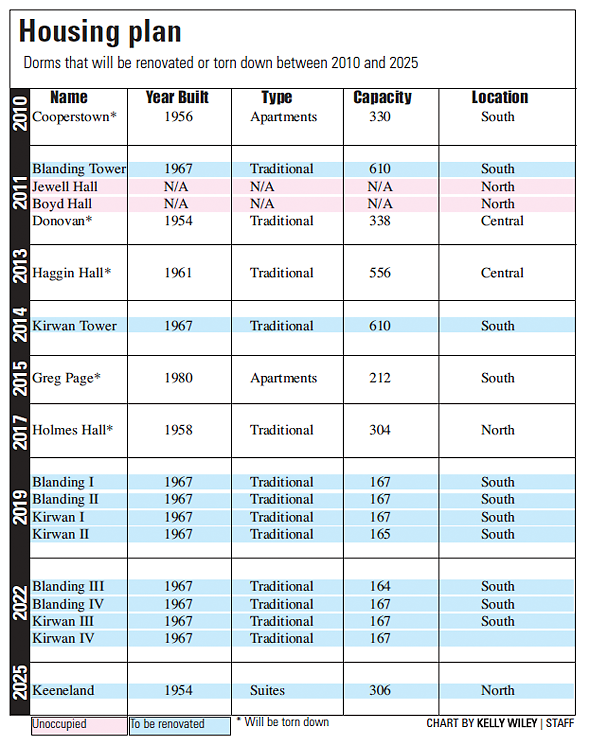Not just redecorating: Hefty renovations coming for many UK dorms and apartments
April 7, 2009
When today’s students return to UK for their 25-year reunion, they may not be able to find the dormitory they lived in for part of their college experience.
UK housing has planned a “domino effect†for the next 18 years that will result in all but five campus dormitories being renovated, or else demolished with new buildings in their place.
Baldwin, Ingles, New North and Smith halls, all built in the last five years, and Patterson Hall will not be impacted.The seven-phase housing plan is starting now, said Ben Crutcher, UK’s vice president for Auxiliary Services. This month, UK is taking bids for a contractor to rebuild Cooperstown Apartments, which will be demolished this fall.
The majority of the current residents of Cooperstown Apartments will be moved to Greg Page Apartments, which now mostly houses Bluegrass Community and Technical College students. The remaining students will move to other housing complexes on and off campus.
Although UK will work with a contractor to develop the plans for the new complex where Cooperstown Apartments currently sit, one option is to create retail space on the first floor and to use the second, third and fourth floors for residents.
The university will require that the contractor building the new housing meet with students to discuss the new residence.
Crutcher said normally open forums and other events set up to discuss housing have low attendance, but he hopes UK can engage current students on what they want from housing, even though they may not be living in it.
“If they tell us, they get what they want,†Crutcher said. “If they don’t tell us, they get what we want.â€
The Cooperstown Apartments project will be the first piece to fall in the “domino effect.†Much like Cooperstown, UK plans on moving students to existing housing, then closing the old buildings. Once a new building opens to provide housing, another can be torn down without giving up needed beds, Crutcher said.
The next phase will involve the demolition of Boyd, Jewell and Donovan halls.
Over the 18 years, the plan will add about 1,500 beds to UK’s campus.
UK’s long-term plan calls for suite-style housing and some apartments and townhouses. For example, Blanding Tower will be renovated in 2011-12 with every room becoming a single bedroom with a shower.
Crutcher said the suite-style follows a shift in what college students want from housing. Unlike what the 40 or 50-year-old residence buildings on campus are structured to provide — shared rooms with bathrooms for multiple residents — students prefer the suites, Crutcher said.
The change in student thinking is already evident, he said. Baldwin, Ingles, New North and Smith halls — all new buildings with suite-style living — saw 5,000 students apply for 684 beds last year.
Crutcher hopes students want to live in the new housing but said it could pose a problem — if too many people want to live on campus, UK could run out of space to house all the students.
After each phase of the project, UK will assess how it needs to continue by looking at factors such as where to place the residence buildings on campus or how the cost has changed.
The total cost of the 18-year project is $588 million. Of that, $220 is paid by the university. The rest is paid for with private investment — contractors who will sign an agreement with UK, which in part collects the rental money from residents for the contractors.
Although the contractors will collect the money, housing costs will be capped at a state-mandated rate, much like tuition. UK housing hopes to keep that rate at or under a 4 percent increase per year. The contractors will be required to maintain the buildings, but Residence Life services and other current housing policies will remain the same, Crutcher said.
The costs of living in the new buildings have not been determined, Crutcher said, and it is likely seniority will play a role in who will get to live in the new dormitories.
































































































































































